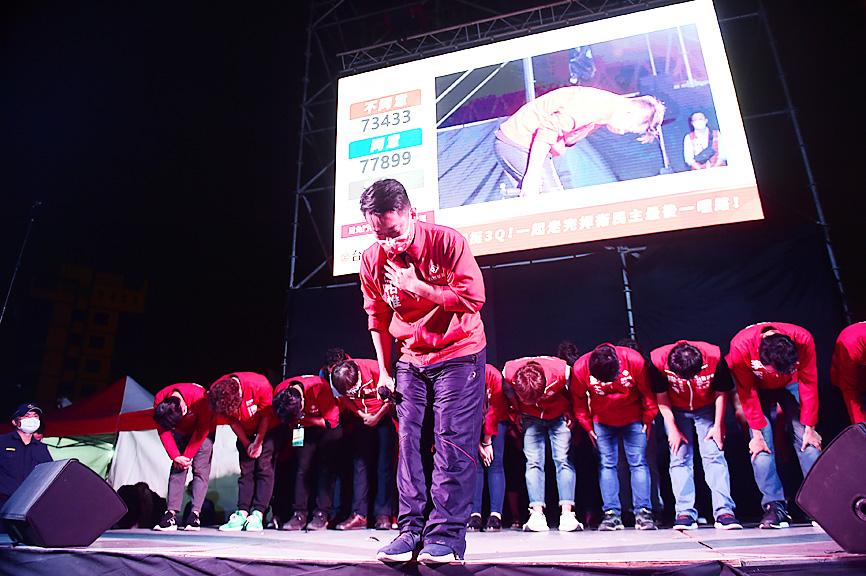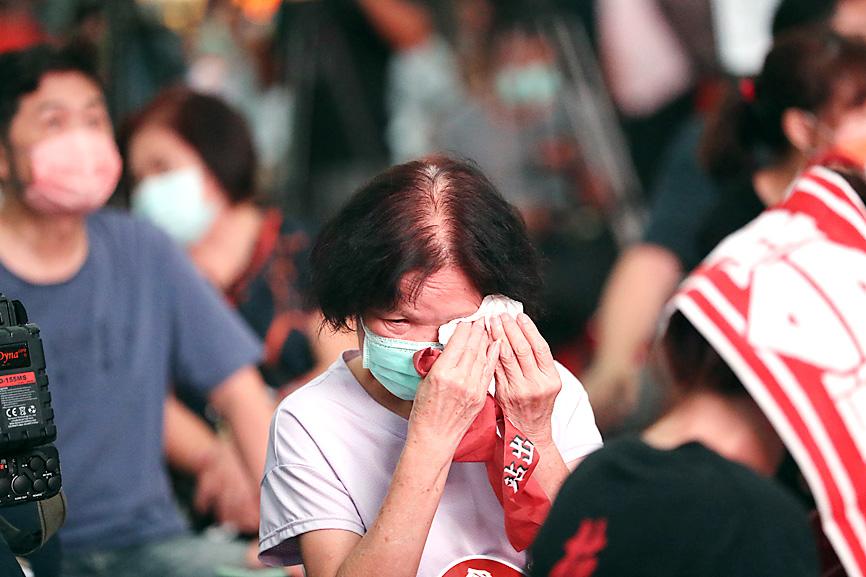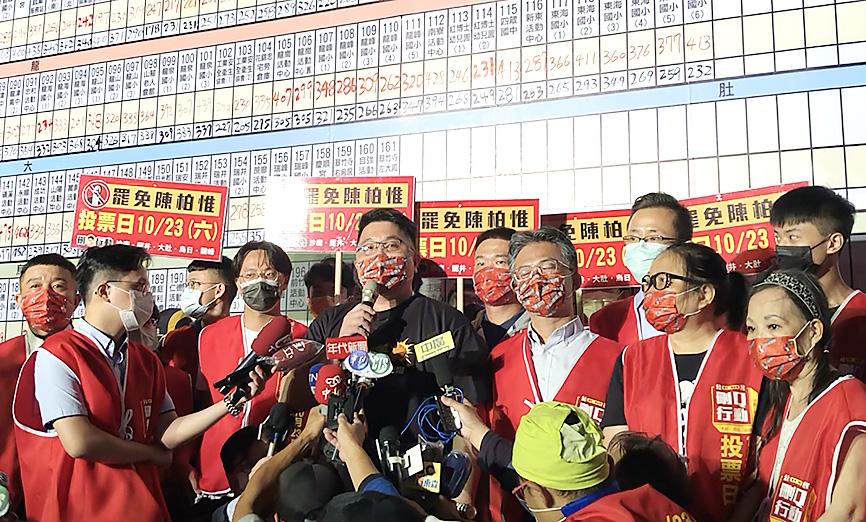Voters in Taichung yesterday recalled Taiwan Statebuilding Party Legislator Chen Po-wei (陳柏惟), making him the first legislator in the nation’s history to lose a recall election.
A total of 77,899 votes were cast to recall Chen, while 73,433 voted against, the Taichung City Election Commission said, adding that 51.72 percent of the city’s second electoral district turned out.
The Central Election Commission is to confirm the final figures within the next seven days, it said.

Photo: Liao Yao-tung, Taipei Times
Commission data showed that there are 294,976 eligible voters in the second district, comprised of Dadu (大肚), Shalu (沙鹿), Longjing (龍井), Wufong (霧峰) and Wurih (烏日) districts.
Chen won the seat in January last year in an election against then-incumbent Chinese Nationalist Party (KMT) legislator Yen Kuan-heng (顏寬恒), a member of a powerful political family in Taichung and the son of former Non-Partisan Solidarity Union legislator Yen Ching-piao (顏清標).
Under the Civil Servants Election and Recall Act (公職人員選舉罷免法), 25 percent of eligible voters — 73,744 for the second district — must vote in favor of a recall to meet a threshold for an election to be valid.

Photo: CNA
A by-election is to be held within three months to fill the legislative seat, the commission said.
After the outcome was announced, Chen thanked supporters gathered at his Taichung campaign headquarters, where he led other Taiwan Statebuilding Party officials and staff in a bow.
Chen said that it was not a total defeat, as “I had won last time, and had gained the working experience as a legislator for one year and nine months. Through this recall campaign, our party has also grown up. We are a small party, and it was hard to mobilize initially. Now our party has matured.”

Photo: CNA
Referring to the 73,433 votes against the recall, Chen said that “we did not lose this battle,” as that number was quite close to the threshold.
“It means that through the past year and nine months that I served in the legislature, we gained the support of 73,433 local residents who identify with and approve of my work,” he said.
Taiwan Statebuilding Party Chairman Chen Yi-chi (陳奕齊) said Chen Po-wei was attacked by the combined forces of the Yen family, the KMT and the Chinese Communist Party.
“Despite the result, our party has not been knocked out, and we will work hard to safeguard Taiwan’s democracy,” he said.
Liu Kang-yen (劉康彥), spokesman for the Democratic Progressive Party, which supported Chen Po-wei in the recall, said the KMT should refrain from pursuing more “revenge recall” elections.
Yang Wen-yuan (楊文元), who initiated the recall election, claimed he voted for Chen Po-wei in January last year, but later regretted it.
“This is the most glorious moment for Taichung’s second electoral district,” Yang said. “It shows that Taiwan’s democracy has made progress, and it also serves as a warning to all elected politicians not to forget their pledges to voters.”
KMT Chairman Eric Chu (朱立倫) said that Chen Po-wei’s support for lifting an import ban on pork containing ractopamine was among the reasons voters sought “to oust an arrogant legislator.”

Intelligence agents have recorded 510,000 instances of “controversial information” being spread online by the Chinese Communist Party (CCP) so far this year, the National Security Bureau (NSB) said in a report yesterday, as it warned of artificial intelligence (AI) being employed to generate destabilizing misinformation. The bureau submitted a written report to the Legislative Yuan in preparation for National Security Bureau Director-General Tsai Ming-yen’s (蔡明彥) appearance before the Foreign Affairs and National Defense Committee today. The CCP has been using cognitive warfare to divide Taiwanese society by commenting on controversial issues such as Taiwan Semiconductor Manufacturing Co’s (TSMC, 台積電) investments in the

HELPING HAND: The steering committee of the National Stabilization Fund is expected to hold a meeting to discuss how and when to utilize the fund to help buffer the sell-off The TAIEX plunged 2,065.87 points, or 9.7 percent, to close at 19,232.35 yesterday, the highest single-day percentage loss on record, as investors braced for US President Donald Trump’s tariffs after an extended holiday weekend. Amid the pessimistic atmosphere, 945 listed companies led by large-cap stocks — including Taiwan Semiconductor Manufacturing Co (TSMC, 台積電), Hon Hai Precision Industry Co (鴻海精密) and Largan Precision Co (大立光) — fell by the daily maximum of 10 percent at the close, Taiwan Stock Exchange data showed. The number of listed companies ending limit-down set a new record, the exchange said. The TAIEX plunged by daily maxiumu in just

INVESTIGATION: The case is the latest instance of a DPP figure being implicated in an espionage network accused of allegedly leaking information to Chinese intelligence Democratic Progressive Party (DPP) member Ho Jen-chieh (何仁傑) was detained and held incommunicado yesterday on suspicion of spying for China during his tenure as assistant to then-minister of foreign affairs Joseph Wu (吳釗燮). The Taipei District Prosecutors’ Office said Ho was implicated during its investigation into alleged spying activities by former Presidential Office consultant Wu Shang-yu (吳尚雨). Prosecutors said there is reason to believe Ho breached the National Security Act (國家安全法) by leaking classified Ministry of Foreign Affairs information to Chinese intelligence. Following interrogation, prosecutors petitioned the Taipei District Court to detain Ho, citing concerns over potential collusion or tampering of evidence. The

‘COMPREHENSIVE PLAN’: Lin Chia-lung said that the government was ready to talk about a variety of issues, including investment in and purchases from the US The National Stabilization Fund (NSF) yesterday announced that it would step in to staunch stock market losses for the ninth time in the nation’s history. An NSF board meeting, originally scheduled for Monday next week, was moved to yesterday after stocks plummeted in the wake of US President Donald Trump’s announcement of 32 percent tariffs on Taiwan on Wednesday last week. Board members voted to support the stock market with the NT$500 billion (US$15.15 billion) fund, with injections of funds to begin as soon as today. The NSF in 2000 injected NT$120 billion to stabilize stocks, the most ever. The lowest amount it